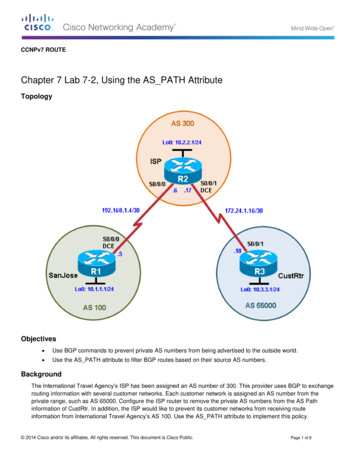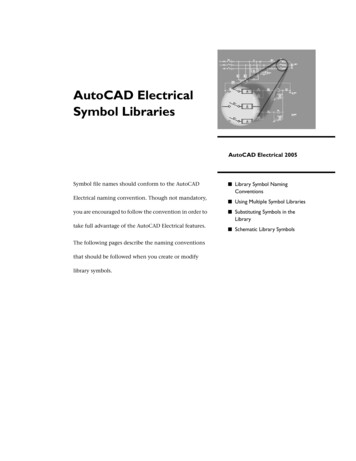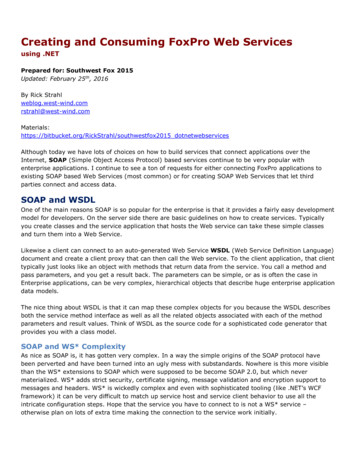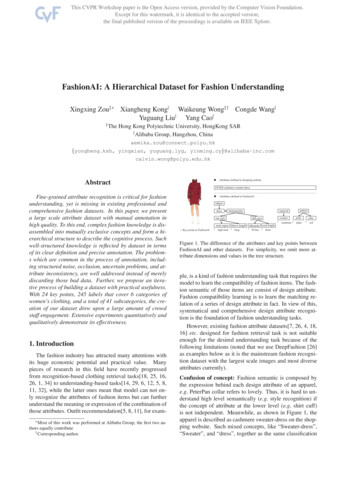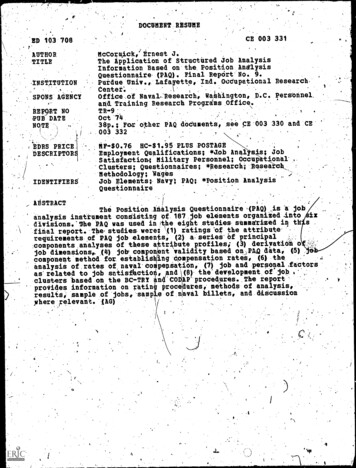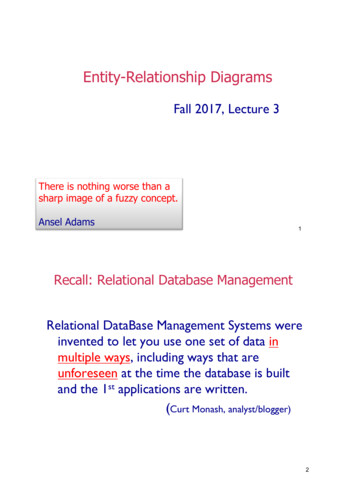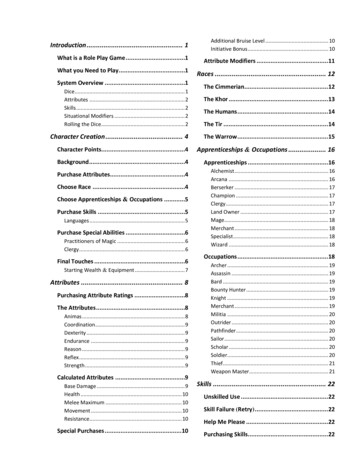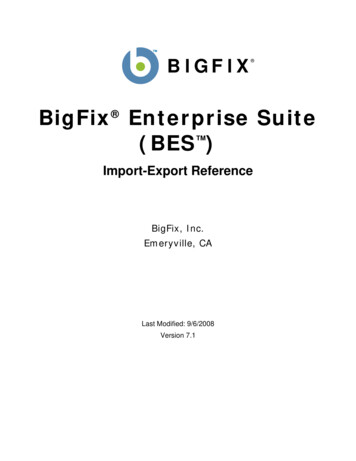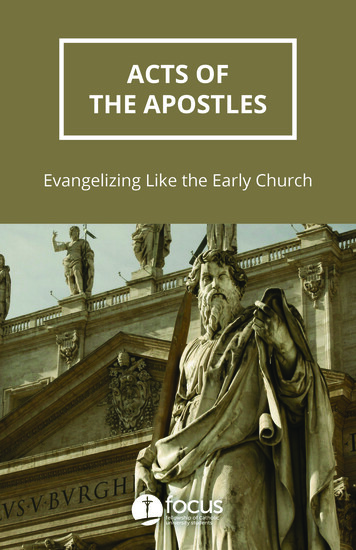
Transcription
Copyright 2016 FOCUS (Fellowship of Catholic University Students).You are free to make copies for non-commercial use as long as youattribute the material to FOCUS. For commercial use, please contact us.All Scripture texts from the New and Old Testaments are taken from RevisedStandard Version Bible: 2nd Catholic Edition, copyright 1989, 1993, Divisionof Christian Education of the National Council of the Churches of Christ inthe United States of America, unless otherwise noted. Used by permission.All rights reserved.2
ACTS OFTHE APOSTLESEvangelizing Like the Early ChurchBy Kevin CotterLeader’s Introduction2 -10Part 1 – Foundations for EvangelizationChapter 1 – Evangelization in the Context of the Church11 - 24Chapter 2 – Evangelization and the Holy Spirit25 - 38Chapter 3 – Prayer as the Heart of Evangelization39 - 50Part 2 – Strategies for EvangelizationChapter 4 – Preparing to Share the Faith51 - 62Chapter 5 – What’s God’s Mission for Your Life?63 - 74Chapter 6 – ‘Win, Build, Send’ Evangelization and the75 - 84Spiritual Multiplication Depth ChartChapter 7 – Learning to Articulate the Faith85 - 98Part 3 – Practicals for EvangelizationChapter 8 – How-to Share Your Testimony99 - 114Chapter 9 – How-to Give a Gospel Presentation115 - 124Chapter 10 – Sharing the Gospel and Fear of Suffering125 - 137
LEADER’SINTRODUCTIONThe Big PictureGod’s word is alive and it should be embodied in our lives.St. Ignatius of Loyola was the founder of the Jesuits and is one ofthe great saints of the Church. During his lifetime, thousands of menjoined the Jesuits. As he would form them for their work to evangelizethe world, he would end every meeting with one phrase: “Go, set theworld on fire.”The fire that Ignatius is talking about is, of course, the fire of the HolySpirit. Jesus commanded His apostles to make disciples of all nations.Our Lord gave them the Holy Spirit at Pentecost to accomplish thismission. In the Acts of the Apostles, we get to see some amazingexamples of how the Holy Spirit works through the apostles to reachpeople throughout the world.The purpose of this study is to give an introduction to evangelizationthrough the narrative of the Acts of the Apostles. We have determinedthree areas of introduction that can be gathered from rinciples.Specifically, we will cover the Church, the Holy Spirit, and prayer.2
Second, evangelization is strategic in nature. The Acts of the Apostlesreveals several gems of evangelistic strategy that we can apply today.Throughout this section, your group will actively strategize how youcan evangelize on your campus.Finally, the Acts of the Apostles reveals practical ways to evangelizethat we can put to use in our own life. We do not want you to finishthis study just knowing about evangelization; we want you to be ableto evangelize. The practical section will give you tools to lead yourgroup in developing evangelistic skills. As the leader, you will need toknow how to perform these practical skills yourself so that you areable to teach them to your group.These three sections are outlined below in the Table of Contents.Table of ContentsPart 1 – Foundations for EvangelizationChapter 1 – Evangelization in the Context of the ChurchChapter 2 – Evangelization and the Holy SpiritChapter 3 – Prayer as the Heart of EvangelizationPart 2 – Strategies for EvangelizationChapter 4 – Preparing to Share the FaithChapter 5 – What’s God’s Mission for Your Life?Chapter 6 – ‘Win, Build, Send’ Evangelization and the SpiritualMultiplication Depth ChartChapter 7 – Learning to Articulate the FaithPart 3 – Practicals for EvangelizationChapter 8 – How-to Share Your TestimonyChapter 9 – How-to Give a Gospel PresentationChapter 10 – Sharing the Gospel and Fear of Suffering3
IntroductionBlessed John Paul II once said, “The saints have always been the sourceand origin of renewal in the most difficult moments in the Church’shistory.” The Acts of the Apostles Bible study is meant to provideexamples of evangelization so that we are able to set the world onfire even in these difficult moments in Church history. We need theexamples of the apostles and the saints to live out evangelization,and your campus needs your example of evangelization to live it outas well. If you need any help using this Bible study format, please seethe article below.How FOCUS Equip Studies WorkEach FOCUS Equip study highlights one particular passage ofScripture. As the leader, you guide a discussion about the passage,which allows participants to discover truths within the passage forthemselves. This process is called self-discovered learning. Its formatcan help participants learn about Scripture and the way to discoverScripture on their own.At the same time, you are not left alone to understand the Scripturesby yourself. Each chapter will contain a section titled “What Do I Needto Know about This Passage?” It will provide you with details aboutthe passage, along with summaries about the passage’s big picture,how it applies to Jesus, and how it can apply to your group.UNDERSTANDINGWHAT DO I NEED TO KNOWABOUT THIS PASSAGE?4
The discussion guide supplies you with an opening question, somebackground information to share about the passage, and a set ofexample questions and answers on each passage to use with yourgroup.DISCUSSIONDISCUSSION GUIDE FORYOUR BIBLE STUDYPrepare by studying “What Do I Need to Know about This Passage?”before the Bible study, and then use the discussion guide to direct theconversation with your group.How to Prepare Your StudyWith all of this information at your disposal, you are all set andready to go. You just need to pass out the notes, ask each questionas it is written, and read the answers to the questions, right? Well,not exactly. It would not make for a very engaging Bible study. Thismaterial is a Bible study in a can: It is meant to preserve good-qualityBiblical content and allow for a broad distribution, but someone stillneeds to take the material out of the can, spice up the content, andserve it to your study. That person is you.This is where the audience for your study is crucial; these are thepeople for whom you are “cooking.” Whether you have a group thathas never heard the Gospel before or a group that attempts to liveout the Gospel each day, you can adapt the Bible study to the group.5
IntroductionThe flexibility of this format is what can make it so effective.Most likely, however, you will have a group with both kinds of people.Follow the example of my dance lesson: try to create a Bible studywhere beginners can learn the basics while the experts can berejuvenated. Scripture is a great way to do this. St. Gregory the Greatonce said, “Holy Scripture is a stream in which the elephant may swimand the lamb may wade.” Both groups should be able to discoversomething meaningful in the Scripture passage.For more on How to Lead a Bible study, check out our resourceon FOCUSEquip.org. As a review, FOCUS Bible study leaders have3 roles and 3 goals in each study.Your 3 Key RolesWith all of the above information in mind, remember that youhave 3 key roles in this study. These 3 roles are your contributionto the study, and doing these 3 things well will make the studysuccessful.1.Prayer: Ultimately, it will be God Who changes the lives ofthe participants. By personal prayer and praying for yourparticipants, you open the door for God to accomplish greatthings. Please take time to pray for your group, talking withGod about each icipants,gettingto know them, meeting them outside of Bible study, andbecoming real friends will be a great asset to the study.Create an environment that is open and personal, allowing6
participants to feel comfortable expressing their thoughtsand experiences.3.Facilitator: A good discussion really enhances the fruitfulnessof a Bible study. Take the time to review the study and askgood, relevant questions to your group. Guide the discussion,allowing everyone to participate. Bring the discussion backif it gets too far astray.Your 3 Key GoalsThere will, no doubt, be many questions and discussions that comeup throughout the study. You may even find yourself a bit lost hereor there. However, the goals listed below are what you are ultimatelytrying to accomplish. Keeping these in mind throughout the study willhelp you stay on course.1.Deep Transformation: Through interaction with God’s wordand one another, it is our hope that the lives of your Biblestudy members will be profoundly changed. The purpose ofa Bible study is not to simply learn information or to be apart of a Bible study club, but allow the Lord to transform ourlives. Specifically, we hope that students, through Scripture,are drawn more intimately to our Lord in the sacramentsand liturgy of the Church where they can most fully receivethe gift of God’s grace in their lives.2.Intimate Fellowship: If people are going to be deeplytransformed, they will need others along the way, not only tohelp this transformation, but also to make sure they continuethis transformation in the future. Your goal as a leader isto take a group of people with various backgrounds and7
Introductionpersonalities and help them form authentic relationshipswith one another.3.Spiritual Multiplication: Another important dynamic of smallgroups is their ability to be reproduced. As you lead, praythat the Lord will raise up members of your small group to goon to disciple others and to lead Bible studies of their own.Final NoteOne of the best ways to learn how to lead a Bible Study is to learn fromothers. Consider observing someone else’s Bible study to learn howthey have been successful. Also, ask a missionary or your disciplerto come to your study and give you feedback on how you are doing.The ChallengeTo properly lead this study, you will need to prepare in advance andapply God’s word in your own life.8
NOTES9
NOTES10
Chapter 1Evangelization in theContext of the ChurchActs 1UNDERSTANDINGPages 12 - 17DISCUSSIONPages 18 - 2411
Understanding / Evangelization in the Context of the ChurchUNDERSTANDINGWHAT DO I NEED TO KNOWABOUT THIS PASSAGE?Read Acts 1The Big PictureThe opening of the Acts of the Apostles outlines the entire book whilealso showing that evangelization starts within the context of theauthority of the Church.The Acts of the Apostles is a historical narrative of the work of the HolySpirit in the early Church. From the founding of the Church to the dayof Pentecost to the preaching of the apostles, the Holy Spirit is workingto spread the gospel message to the entire world. This historical genreor type of literature would have been known to its first audience. Theancient world had similar works such as the “Acts of Caesar,” whichpraised the greatness of the caesars while providing moral lessons inthe process. Acts of the Apostles follows a similar pattern as it recountsthe greatness of the apostles and the power of Holy Spirit.Who Wrote the Acts of the Apostles? (Acts 1:1-2)Despite not directly referencing himself, St. Luke is normally proposed12
as the author of the Acts of the Apostles. Several pieces of evidencehelp us know that this is true. Acts 1:1 addresses the letter to Theophilus and referencesthe author’s first book about what “Jesus began to do andteach.” The Gospel of Luke is also addressed to Theophilus.Similar themes and vocabulary are used in each narrative. Historically, several early Church Fathers such as Irenaeus(180 AD), Clement of Alexandria (200 AD), and Eusebius (325AD) all recognized St. Luke as the author. Through the book, we also learn that St. Luke is a companionof St. Paul during his missionary journeys. In the second halfof Acts, the St. Luke uses the words “we,” “us,” and “our” inthe narrative (16:10-17; 20:5-15; 21:1-18; 27:1-28:16).Outside of the book of Acts, we know very little else about St. Luke.Colossians 4:14 tells us that St. Luke was a physician, and it is alsobelieved that he was a Gentile and not a Jew.Structure of the Book (Acts 1:3-11)The Acts of the Apostles serves as a bridge between the Gospeland our lives today. The Acts of the Apostles is a continuation ofJesus’ mission on earth, and at the same time, the book has no realconclusion. In an indirect way, this reinforces the message that Jesus’mission continues through us, the Church, today.Jesus’ words in Acts 1:8 set the scene for the entire book: “But youshall receive power when the Holy Spirit has come upon you; and youshall be my witnesses in Jerusalem and in all Judea and Samaria andto the ends of the earth.”13
Understanding / Evangelization in the Context of the ChurchThis passage foretells the apostles’ fate. The word “witness,” inGreek, means martyr. This is where the English word martyr comesfrom. Ten out of the eleven apostles (all but John) would be killed forpreaching the gospel.Acts 1:8 also gives a geographical roadmap for how the rest of thebook will unfold: Jerusalem (Chapters 1-7) Judea and Samaria (Chapters 8-12) The “ends of the Earth” (Roman Empire) (Chapters 13-28)Application to JesusThe Acts of the Apostles is not a separate story from the gospelbut just another chapter, as the apostles continue the work andteachings of Jesus.Major Themes in Acts 1Ends of the EarthJesus gives His disciple a clear goal: Preach the message of thekingdom to the ends of the earth. But this wasn’t a new idea; it wasa fulfillment of the prophesies and covenants of the Old Testament.The beginning of these covenants began in the book of Genesis whenGod established His covenant with all of mankind through Adam andEve. As the result of sin in Adam and Noah, God re-establishes Hiscovenant just with Abraham and his descendants (which includesthe Israelites). It was always God’s plan to re-establish His covenantwith all of mankind once again. Isaiah 49:6 states, “You will be my14
servant to raise up the tribes of Jacob and to restore the preserved ofIsrael; I will give you as a light to the nations, that my salvation mayreach to the ends of the earth.”In Acts, we see the fulfillment of this plan as Israel is restored (twelveapostles symbolizing the restored twelve tribes of Israel; see Luke 22:2830) and told to preach salvation to the ends of the earth.We see the apostles continue the restoration of Israel, as Acts firstfocuses on St. Peter’s preaching of the gospel to the Jews (Acts 1-12)and then St. Paul’s preaching of the gospel to the ends of the earth withthe Gentiles (Acts 13-28).Passing of Authority (Acts 1:12-26)Acts 1:12-26 is a great example of how authority passes on within theChurch. Let’s look at some context from the Old Testament and Gospelsto see where this originated and how it applies to bishops today.This process was set in motion by Jesus, who instructed St. Peter tolead the Church during His absence (Matthew 16:13-20). In Matthew16, St. Peter boldly declares that Jesus is the Messiah—the anointedone or king who would re-establish God’s kingdom on earth. In Jesus’response, He appoints St. Peter to an office in His kingdom called albeyit in Hebrew or (in English, “one over the household”). This office wasfound in many ancient kingdoms, including Israel’s (see Isaiah 22:15-25).The fact that the position was an office was also significant, becauseoffices are passed on from one person to another. (For more on this,see the article “The Kingdom, Authority, and the Papacy” by Kevin Cotterthat goes with this chapter.)Some of this authority was also extended to the other apostles as well. InMatthew 18:18, Jesus grants the power to bind and loose to the apostles15
Understanding / Evangelization in the Context of the Church(Note: Apostles and disciples are sometimes used interchangeably inMatthew; see Matthew 10:1-2). This model establishes the authoritystructure of the pope and bishops in the Church today and the waythat this authority is passed on.St. Clement, who was ordained a bishop by St. Peter himself, gives usa historical account of how authority passed from the apostles in theearly Church in the year 96 AD:Through countryside and city [the apostles] preached, andthey appointed their earliest converts, testing them by theSpirit, to be the bishops and deacons of future believers. Ourapostles knew through our Lord Jesus Christ that there wouldbe strife for the office of bishop. For this reason, therefore,having received perfect foreknowledge, they appointed thosewho have already been mentioned and afterwards added thefurther provision that, if they should die, other approved menshould succeed to their ministry. (St. Clement, Letter to theCorinthians 42:4-5, 44:1-3)With this passing of authority at the beginning of the Acts of theApostles, St. Luke makes it clear that evangelization and the movementof the Holy Spirit pour forth from the offices that Jesus established. Thisis why FOCUS always receives the support of the bishop of a diocese orarchdiocese that we serve before our apostolate works at a campus.Evangelization within the context of the authority of the Church is thebiblical model for evangelizing to the ends of the earth.Application to Your LifeActs has no definitive conclusion. The mission of the apostles continuesto be the Church’s mission today.16
NOTES17
Discussion / Evangelization in the Context of the ChurchDISCUSSIONDISCUSSION GUIDE FORYOUR BIBLE STUDYActs 1STEP 1: OPENERWhy do you think Acts of the Apostles is important for us to studytoday?STEP 2: BACKDROPThe Acts of the Apostles is a historical narrative of the work of theHoly Spirit in the early Church. From the founding of the Church tothe day of Pentecost to the preaching of the apostles, the Holy Spiritis working to spread the gospel message to the entire world. Today,we are going to get at an overview of the Acts of the Apostles and takea look at its first chapter.STEP 3: PASSAGEToday’s passage is Acts 1:1-26. Let’s learn a little background aboutthe book of Acts by reading Acts 1:1-2.STEP 4: EXPLORATION: QUESTIONS AND ANSWERSNote that answers appear in italics.18
Exploration: Questions and Answers1. The author begins the Acts of the Apostles with, “In the firstbook.” What is this first book?Answer: The Gospel of Luke2. Read Luke 1:1-4. Who is the author of the Acts of the Apostles?Answer: St. Luke. Both the Gospel of Luke and Acts are addressed toTheophilus.3. Read Acts 16:10-13 and Colossians 4:14. What do we learn aboutSt. Luke? How do you think that changes the way he writes?Answer: He is a companion of St. Paul for some of his missionary travels,and he is a physician. Being a companion, he has firsthand experience ofstories or has talked to the people directly involved. Being a physician, hemight write more about healings and be able to describe them well.4. In verse 1, what do the words “all that Jesus began to do andteach” imply for the book of Acts?Answer: Jesus continues to work and teach through the apostles and theChurch.19
Discussion / Evangelization in the Context of the ChurchRead Acts 1:3-115. What is Jesus’ plan for the apostles in verses 5 and 8?Answer: They are to wait for the Holy Spirit and then be witnesses inJerusalem, Judea, and Samaria and to the ends of the earth.6. Use the first paragraph of the section Structure of the Book in“What Do I Need to Know about This Passage?” to show how Acts1:8 is a thumbnail sketch of the entire book.7. Read Luke 22:28-30 and Isaiah 49:6. How is Acts 1:8 a fulfillmentof this prophesy about a restored Israel and a message for thenations?Answer: See the passage “Ends of the Earth in “What Do I Need to Knowabout This Passage.”Read Acts 1:12-268. Read John 20:19. What changed between that event and whatwe see here in Acts 1:12-14?Answer: They had a living encounter with the resurrected Jesus.20
9. Despite their fears and failings, why do you think God stilltrusts the apostles to be the leaders of His Church?Allow the group to discuss.10. In verse 20, St. Peter refers to Judas’ position as an office.From what you know about an office, why is this significant?Answer: Offices are passed on from one person to another. Think ofoffices like a president or king; they don’t end with the death of thatperson.11. What background do we have regarding the passing of anoffice in God’s kingdom for the Gospels and Old Testament?Allow the group to discuss. Note to the Leader: Your group may havean expert understanding of papal and episcopal succession, or thismight be their first time looking at this issue. This question can serveas a good gauge for where they are in their understanding. Use thesection “Passing of Authority” from “What Do I Need to Know about ThisPassage?” and the accompanying article “The Kingdom, Authority, andthe Papacy” to fill your group in on any gaps that might exist. The quoteby St. Clement is particularly helpful in conveying how this processrelates to our bishops today.12. When most Christians think of the Acts of the Apostles andthe Holy Spirit, they most likely don’t first associate it withChurch offices or authority. Why do you think St. Luke putsthis section at the beginning of the Gospel?Allow the group to discuss.21
Discussion / Evangelization in the Context of the Church13. Why do you think that someone might believe thatevangelization within a Church structure might reduce theeffectiveness of evangelization?Allow the group to discuss.14. Why do you think that evangelizing within the context of theChurch’s authority is important?Allow the group to discuss.22
NOTES23
NOTES24
Chapter 2Evangelization and the Holy SpiritActs 2:1-21, 37-42UNDERSTANDINGPages 26 - 31DISCUSSIONPage 32 - 3825
Understanding / Evangelization and the Holy SpiritUNDERSTANDINGWHAT DO I NEED TO KNOWABOUT THIS PASSAGE?Read Acts 2:1-21, 37-42The Big PictureThe Holy Spirit is instrumental to our evangelization.The Feast of PentecostWhen most Christians hear the word “Pentecost,” they immediatelythink of the coming of the Holy Spirit in the second chapter of theActs of the Apostles. But before this event, the Feast of Pentecost hada deep tradition within the Jewish culture.The Feast of Pentecost was celebrated approximately 50 days afterthe Passover. In the Acts of the Apostles, this would have been50 days after Jesus’ death. The feast of Passover was one of threepilgrim feasts that required Jewish men to travel to Jerusalem. It hasagricultural roots, but theological significance was added over time.In particular, it evolved into a renewal of the Jews’ covenant with Godand a celebration of the giving of the Torah, the Jewish law. It is duringthis Jewish feast that the Holy Spirit comes in a powerful way to theapostles.26
Expectation of the Holy Spirit (Acts 2:1-13)The coming of the Holy Spirit in Acts can appear strange and almostrandom to the 21st-century reader. The Spirit comes suddenly,mightily, and with “tongues of fire.” The author is keen to mention notonly that the preaching of the apostles was translated into severallanguages, but he also takes the pains to mention a long list ofnationalities, some which we might not recognize.Similar to the background of the Feast of Pentecost, the backgroundof the Holy Spirit in the Old Testament can helps us understand thetrue significance of what is going on in the passage.The coming of the Holy Spirit was tied up with a new age where aMessiah king would re-establish the Jewish kingdom. One suchpassage in the Old Testament comes from the prophet Ezekiel.Speaking of this new age, Ezekiel says,For I will take you from the nations, and gather you fromall the countries, and bring you into your own land. I willsprinkle clean water upon you, and you shall be clean fromall your uncleannesses . A new heart I will give you, and anew spirit I will put within you . I will make them one nationin the land, upon the mountains of Israel; and one king shallbe king over them all. (Ezekiel 36:24-26; 37:22)In Acts 2, the author, Luke, is going out of his way to show that theprophesies of the Old Testament like this one from Ezekiel are beingfulfilled.Here are a few insights on how the Old Testament prophecies arebeing fulfilled.27
Understanding / Evangelization and the Holy SpiritThe NationsOne of the biggest problems of restoring the kingdom of Israel is thather people had been taken into exile. Out of the twelve tribes of Israel,the ten northern tribes were taken into captivity by the Assyriansin 722 BC, and eventually most of these members of Israel marriedpeople from other nationalities. The Jewish covenant was based onmarrying within Judaism and staying within the land.But prophets like Ezekiel prophesied that God would still be able togather these Jews from the nations through His Spirit (Ezekiel 36:24).Here in Acts, we get a foretaste of this saving action by God, as Israelitesfrom all over are hearing the message of the New Covenant. At thesame time, the roadmap found in Acts 1:8 (mentioned in Chapter 1 ofthis study) is beginning to be fulfilled.New LawThe tradition of the Jewish Pentecost focused on the giving of the Torahor Jewish law. Here, God is placing a new law on the hearts of mankindthrough the giving of the Holy Spirit.Tongues of FireMaybe the most odd and amazing part of this event is the crowd’sability to hear the apostles’ preaching in their own language. Thiswould have been particularly odd for the crowd to hear, because manyof the apostles would have been from Galilee, a region not known forits intelligence or crafty speech. Maybe the best explanation for thisincredible sign is the Old Testament account of the Tower of Babel. Atthe tower of Babel, God confused and scattered the builders by givingthem different languages. Here, God gathers His people togetherthrough one language.28
Application to JesusThe coming of Jesus brings a new age of the Holy Spirit.St. Peter’s Presentation of the Gospel (Acts 2:14-21)As the appointed shepherd of the apostles and the Church while Jesusis gone (Matthew 16:16-20), St. Peter steps up to explain to the crowdwhat is going on. He specifically notes a passage from the prophetJoel to explain how the Holy Spirit is coming at this time.This passage from Joel 2:28-32 plays an important role in the Actsof the Apostles. Several of the quotes within the passage occurthroughout the book of Acts.Example Joel passages used in Acts: Your daughters shall prophesy (Acts 21:8-9) Young men shall see visions (Acts 9:10) Wonders and signs (Acts 2:22; 14:3; 15:12) Calling upon the name of the Lord (Acts 22:16)St. Peter’s testimony continues to recount the basic facts of Jesus’life, death, and resurrection while also showing how this fits into theprophesies of the Old Testament.29
Understanding / Evangelization and the Holy SpiritThe Crowd’s Reaction (Acts 2:37-42)The crowd is cut to the heart after St. Peter’s testimony about Jesus.They ask him, “What shall we do?” St. Peter instructs them to bebaptized so that their sins may be forgiven, and through this Baptismthey too will receive the gift of the Holy Spirit (Acts 2:38; for more onthe Catholic Church’s view on baptism and the Holy Spirit, see CCC1213-1216).Three thousand followers were added that day through the preachingof St. Peter. These people go on to live out the four characteristicsof the early Church and our Church today: “the apostles’ teaching[Scripture], fellowship, breaking of the bread [the Mass], and theprayers” (Acts 2:41-42).There are several directions that your group could go as they beginto unravel the deep meaning found in these verses. While it is easy toget caught up in the historical background or prophesy surroundingthis passage, be sure to make the verses apply to the lives of theparticipant. We are all called to be open to the Holy Spirit and deepenthe Spirit’s action in our lives. How do we open our hearts to allow theSpirit to move more deeply?Application to Our LivesHow can we build the habit of being open to the Holy Spirit?30
NOTES31
Discussion / Evangelization and the Holy SpiritDISCUSSIONDISCUSSION GUIDE FORYOUR BIBLE STUDYActs 2:1-21, 37-42STEP 1: OPENERToday, we are looking at Pentecost and the coming of the Holy Spirit.When you think of the Holy Spirit, what comes to mind?STEP 2: BACKDROPWhen most Christians hear the word “Pentecost,” they immediatelythink of the coming of the Holy Spirit in the second chapter of theActs of the Apostles. But before this event, the Feast of Pentecost hada deep tradition within the Jewish culture.The Feast of Pentecost was celebrated approximately 50 days afterthe Passover. In the Acts of the Apostles, this would have been 50days after Jesus’ death. The feast of Pentecost was one of threepilgrim feasts that required Jewish men to travel to Jerusalem. It hasagricultural roots, but theological significance was added over time.In particular, it evolved into a renewal of the Jews’ covenant with Godand a celebration of the giving of the Torah, the Jewish law. It is duringthis Jewish feast that the Holy Spirit comes in a powerful way to theapostles.32
STEP 3: PASSAGEToday’s passage is Acts 2:1-21, 37-42. Start by reading Acts 2:1-14.STEP 4: EXPLORATION: QUESTIONS AND ANSWERSNote that answers appear in italics.Exploration: Questions and Answers1. Similar to the background to the Feast of Pentecost, thebackground of the Holy Spirit in the Old Testament can helpsus understand the true significance of what is going on in thepassage. Read Ezekiel 36:24-27 and Ezekiel 37:21-23. In thesepassages, Ezekiel is taking about a new age of restoration. Whatis included in this new age?Answer: Some elements: Sprinkling of new water (Baptism), a new heart,God’s spirit, gathering of His people from the nations, one nation underone king.2. What elements found in Ezekiel are found here in Acts 2:1-14?Answer: We see the foretaste of the Lord gathering the Jews from all thecountries (Ezekiel 36:24; Acts 2:8-11). God is putting a new Spirit into Hispeople
mission. In the Acts of the Apostles, we get to see some amazing examples of how the Holy Spirit works through the apostles to reach people throughout the world. The purpose of this study is to give an introduction to evangelization through the narrative of the

